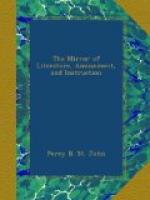ENTRANCE TO THE BOTANIC GARDEN, MANCHESTER.
[Illustration: Entrance to the Botanic Garden, Manchester.]
Manchester is distinguished among the large towns of the kingdom for its majority of enlightened individuals. “The whole population,” it has been pertinently observed by a native, “seems to be imbued with a general thirst for knowledge and improvement.” Even amidst the hum of its hundreds of thousand spindles, and its busy haunts of industry, the people have learned to cultivate the pleasures of natural and experimental science, and the delights of literature. The Philosophical Society of Manchester is universally known by its excellent published Memoirs: it has its Royal Institution; its Philological Society, and public libraries; so that incentives to this improvement have grown with its growth. Among these is the Botanical and Horticultural Society, formed in the autumn of 1827, whose primary object was “a Garden for Manchester and its neighbourhood.” Previously to its establishment, Manchester had a Floral Society, with six hundred subscribers, which was a gratifying evidence of public taste, as well as encouragement for the Garden design.
We find the promised advantages of the plan thus strikingly illustrated in an Address of the preceding date, “The study of Botany has not been pursued in any part of the country with greater assiduity and success than in the neighbourhood of Manchester. Far from being confined to the higher orders of society, it has found its most disinterested admirers in the lowest walks of life. Though to the skill and perseverance of the cottager we are confessedly indebted for the improved cultivation of many plants and fruits, an extensive acquaintance with the choicest productions of nature, and a philosophical investigation of their properties, are very frequently to be met with in the Lancashire Mechanic. But whilst some knowledge of the principles of Horticulture is almost universal; and the inferior objects of attention are readily procured, it is obvious that the difficulty and expense which attend the possession of plants of rare, and more particularly of foreign growth, form a natural and insurmountable obstruction to the researches of many lovers of the science....” “Whatever regard is due to the rational gratifications of which the most laborious life is not incapable, there is a moral influence attendant on horticultural pursuits, which may be supposed to render every friend of humanity desirous to promote them. The most indifferent observer cannot fail to remark that the cottager who devotes his hours of leisure to the improvement of his garden, is rarely subject to the extreme privations of poverty, and commonly enjoys a character superior to the circumstances of his condition. His taste is a motive to employment, and employment secures him from the temptations to extravagance and the natural consequences of dissipated habits."[1] Further, we




